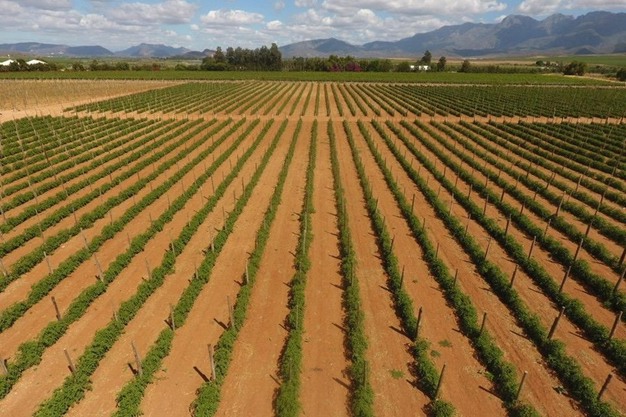Cold-calling fruit industry organisations, with zero experience but a desire to be part of a socially impactful endeavour, business science graduate Kagisho Molatedi lucked out when he came to Mariëtte Kotze, general manager on industry support at Hortgro, representing the deciduous fruit industry.
Growing up in a formerly bustling gold-mining town that has lost its lustre, Kagisho and his brother Tshedisegang ("It seems like we're joined at the hip" he quips) felt the urge to be part of a labour-intensive business with buoyant prospects.
Hortgro's Mariëtte Kotze told him about a public interest organisation whose aim is to plug Generation Z into South Africa's ageing farming sector, while addressing the elephant always in the room: concentration of the means of production in the hands of a few and the concomitant profound economic inequality.
The organisation is a group that calls itself PALS: Partners in Agri Land Solutions, set up eleven years ago by farmers themselves to see black farmers succeed in their neighbourhood. Land reform fatigue colours the national debate: the road lies littered with the wreckage of many agricultural affirmative action projects, well-intentioned and sometimes not so well-intentioned. Many failed projects share particular shortcomings which PALS aims to avoid.
The PALS idea is based on a philosophy of investing in new and existing enterprises, to create new partnerships to the benefit of all shareholders. It is a private sector initiative, where "all involved parties have skin in the game", originating in the Witzenberg Valley, and since replicated elsewhere in the country (Maluti PALS in the Free State, Mpumalanga PALS) where commercial farmers have taken the Witzenberg baton and ran with it. (Lack of buy-in among commercial farmers was identified as a constraint in an external evaluation of the programme last year.)
In the Witzenberg Valley alone, according to the report by an external evaluator, black farmers who're part of the PALS initiative own 2,139 hectares of land outright and an additional 6,520 hectares of land in joint ventures with commercial partners. © Witzenberg PALS Kagisho and Tshedisegang Molatedi's farm Mon Don Estate in the Breede River Valley of the Western Cape
© Witzenberg PALS Kagisho and Tshedisegang Molatedi's farm Mon Don Estate in the Breede River Valley of the Western Cape
The human fundamentals
"Mariëtte Kotze made that introduction between Gerrit van Vuuren and myself and we clicked in terms of what our ambitions and values are," Molatedi says of his first meeting with Van Vuuren, an advocate and strategic and legal advisor to PALS.
Kagisho was joined in this venture by his brother Tshedisegang, a chemical engineer by training. Gerrit van Vuuren, in turn, connected them with Juan-Ivan Smuts, fourth-generation farmer and CEO of Lucerne Agri in Robertson. "It clicked almost at the very second that the very first meeting that we met."
That was two years ago. The Molatedi brothers have since entered into a partnership with Lucerne Agri which packs and markets the fruit and tomatoes grown on their newly acquired farm Mon Don Estate. "We have peaches, nectarines, apricots, and then we also have 15 hectares of tomatoes."
He continues: "There's a very dreamy idea of what entrepreneurship looks like and very idealistic views of how business actually works. This is a lot of hard work. There's nothing like you see on Instagram, you know, entrepreneurs riding around in the nicest of cars, living in the nicest of apartments. It's honestly not like that."
Two things about PALS stand out for them: the first is the wisdom of partnering with someone who knows exactly how the game goes, as Kagisho puts it, and the second is a sense of urgency to get things done. "You know, in an industry as challenging as ours, being late on everything, has devastating effects on the viability of business. If you are not running your business as lean as possible, as cost-efficient as possible, there's almost no chance of survival."
He continues: "Honesty between partners alongside the resilience to stay the course have been the biggest things we've gained from this whole exercise, you know, the human network. These human fundamentals are really what made us resonate so strongly with the PALS model and why we even go as far as saying that we endorse it." © Witzenberg PALS
© Witzenberg PALS
Seeing farming through a different lens
As the first black employers to their employees, who in many cases have vastly more farming experience than themselves, they consciously aim to be tough on standards and kind to people. They grew up in the Free State, home to cattle ranches and row crops. "Often enough you would hear of health and safety incidents on farms and it wakes you up. Once you know someone who's been a victim of poor health and safety practices, you understand the impact it has on families."
Tshedisegang observes that his years in mining taught him that safety isn't primarily a policy matter. "It's more about making sure you go back to your family the same way you came in in the morning."
The intellectual property possessed by generations of farm employees goes lost without the touch of a commercial partner, Kagisho believes.
"Coupling the actual on-farm knowledge with business skills is, I would say, the be-all and end-all of this industry. Through initiatives like PALS there is appetite to pair farm workers with business-minded people. I think that should almost be a non-negotiable in land reform projects. I could perhaps do this in every lifetime," he declares. "That's how much it means to my brother and myself." © Witzenberg PALS Kagisho Molatedi: "I could perhaps do this in every lifetime."
© Witzenberg PALS Kagisho Molatedi: "I could perhaps do this in every lifetime."
For more information: Phathiswa Ngangelizwe
Phathiswa Ngangelizwe
Witzenberg PALS
Tel: +27 (0)23 316 1191
Email: [email protected]
[email protected]
https://www.sapals.co.za/
